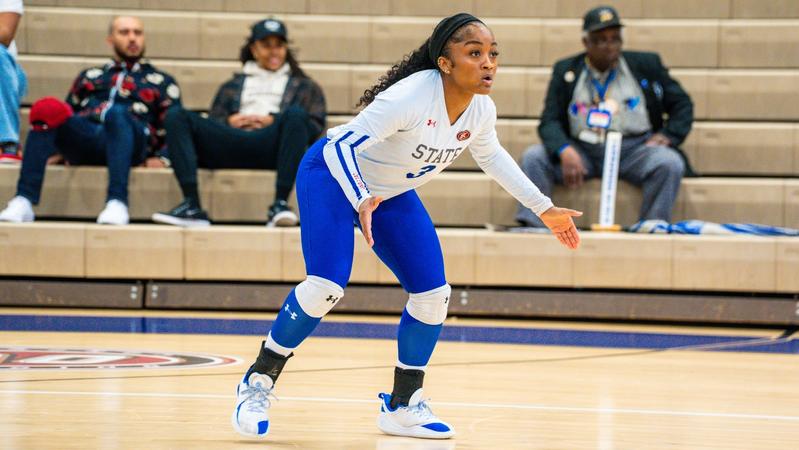- Longtime BYU assistant coach Brent Haring is in his maiden season as a Division I head coach at Louisiana’s Nicholls State University.
- The Latter-day Saint coach finds strength in his spiritual beliefs.
- Haring’s baseball coaching resume includes several years as the skipper of the American Samoa National Team.
NIL
Nicholls State the latest stop for Latter-day Saint coach – Deseret News
‘I never had a job. I just always played baseball.’ — Satchel Paige
It’s no surprise that when the Deseret News recently caught up with longtime college/international baseball coach Brent Haring, he was on a bus loaded with ballplayers, traveling to a road game far from his St. George, Utah, hometown.
A longtime Brigham Young University assistant coach, Haring is wrapping up his first season as head coach at Nicholls State University — a Division I program located along the banks of Bayou Lafourche in southeastern Louisiana.
That’s a long drive from his Washington County neighborhood where Haring grew up smacking whiffle ball backyard dingers with his buddies, competing for the Pine View High Panthers and worshipping in his local Latter-day Saint ward.
But baseball’s a universal language — and the sport has adopted Haring as a world citizen of sorts.
Haring long-ago mastered the baseball coach’s art of snoozing on long flights and lonesome bus rides, always packing light and saving just enough space in your carry-on bag for a broken-in baseball glove.
The stamps filling Haring’s passport reveal his sojourns across the growing baseball globe. Japan. The Dominican Republic. Samoa. Curacao. And then toss in his frequent baseball stops in dozens of U.S. states and American territories such as Guam and American Samoa.
“Being able to see the world through baseball has been a blessing,” observed Haring while navigating a stretch of highway somewhere between Thibodaux, Louisiana, and Jackson, Mississippi.
‘Love is the most important thing in the world, but baseball is pretty good, too.’ — Yogi Berra
It’s no surprise that a guy who played all nine positions as a college player is versatile enough to adapt and embrace teaching and coaching the evolving game across multiple time zones.
Haring played college ball at Colorado Northwestern Junior College and at Southern Virginia University before embarking on a college coaching career that included stops at Harding University in Arkansas, University of Mount Olive in North Carolina, College of the Ozarks in Missouri, his alma mater of SVU — and in his hometown at what was then Dixie State College.
Haring also spent multiple years at BYU — coordinating recruiting, working with Cougar infielders, overseeing team defense prep and, in 2022, serving as the team’s associate head coach.
Then in 2023, Haring was hired as the director of baseball operations at Louisiana State University — one of the premier programs in college baseball. He spent a year in Baton Rouge before accepting his first DI head coaching job at Nicholls State.
BYU head coach Trent Pratt spent more than a decade working in college baseball dugouts with Haring — both at Dixie State and then in Provo.
Pratt’s not surprised his friend has survived and thrived in the grueling, uber-competitive, ever-changing college baseball community.
“Brent’s a people person,” Pratt told the Deseret News. “You’re drawn to him and he’s an honest guy. If you’re that way long enough, it’s going to pay off.”
As a baseball coach, Pratt added, Haring brings calmness to the dugout.
“He’s been around. … Brent’s been around a lot of different coaches and he’s seen a lot of different things. He’s able to take others’ ideas and morph them into his own.”
Most importantly, said Pratt, “Brent treats people the right way. He knows that if you show kids that you love and care for them, they’re going to respond.”
Haring’s maiden campaign as the Colonels’ skipper has been challenging in the baseball-loving Southland Conference. He took over a squad that had qualified for the NCAA regionals in 2024, but then had several players graduate or transfer.
With a record of 16-30, the NSU team could use a bit of luck to qualify for the Southland Conference tournament.
“But it’s been a lot of fun — and a huge challenge,” reported Haring. “We have a long way to go and we’re trying to get there as quickly as we can.”
The Colonels’ manager said being at the helm of a DI baseball team demands “thinking things through a bit more thoroughly and making sure that the decisions I’m making are the right decisions for the program now — and for the future.
“I have an obligation to honor the program and its past.”
And like every other NCAA coach, Haring is tasked with winning games and operating a clean program while managing the new realities of NIL and the transfer portal.
“As a head coach, I’m recruiting my own players all the time,” he said, noting that today’s college baseball scene is “super different” than what he’s experienced across most of his career.
Still, Haring’s pragmatic. He accepts today’s college coaching mantra: “The transfer portal giveth — and it taketh away.”
“You either have to adjust or die,” he said. “We’re trying to adjust and find our niche within the guidelines and how to manage it.”
His tenure on the LSU baseball staff, he added, “has been tremendously beneficial” in the college baseball-crazy corner of the country where he now plies his trade. College sports are simply part of life’s rhythm for Haring’s new neighbors.
“The people in this community love this program,” he said. “It’s not uncommon for our little school to have well over 1,000 fans at our games.”
But Haring said he’s always the same guy — regardless of any particular area’s religious demographics. “My faith is the foundation of everything in my life.”
The lifelong Latter-day Saint added he can trace God’s hand in his professional moves in recent years from Utah to Louisiana.
Haring and his wife, Mary, and their two sons, Tomasi and Nikolao, have also found a welcome landing spot in their new Latter-day Saint congregation.
“They are some of the best people in the world — and I believe Heavenly Father uses us in whatever ways he can. … I’m very grateful for the gospel and what it’s done for me and my life.”
‘I’ve come to the conclusion that the two most important things in life are good friends and a good bullpen.’ — Bob Lemon
Haring regards his 11 years at BYU as pivotal to his ongoing coaching journey.
Lessons he learned in Provo are now serving him well in Thibodaux.
“Coaching at BYU was a dream for me,” he said. “To be able to coach at a university (sponsored) by the religion that I participate in was incredible.
“The school standards, not playing on Sunday, and all those things were incredible.”
The Latter-day Saint population in the Deep South is far different than what he previously enjoyed while coaching in Utah County.
‘Nothing’s ever been as fun as baseball.’ — Mickey Mantle
Haring’s wife, Mary, is of Samoan descent.
That’s a fact without any obvious baseball connection — but almost every detail in Haring’s life has revealed some sort of link to “America’s pastime.”
The Harings marriage has provided the coach with relationships across the Samoan Islands. His father-in-law, who grew up in American Samoa, joked that had he been raised on the U.S. mainland, “he would have played for the Dodgers.”
Meanwhile, Haring long ago committed to learn the Samoan language.
Around 2010, Haring traveled with a group of baseball players to the Samoan Islands to participate in a tournament. It proved to be a prized experience — leading to his hiring as head coach of the American Samoa National Team.
A tiny Pacific island, American Samoa has produced dozens of NFL players. But baseball is still catching on.
Still, Haring enjoyed unexpected success coaching the national team — highlighted in 2019 by an American Samoa victory over Australia, then ranked seventh in the world, and a second-place finish at the Oceania U-18 Baseball Championship in Guam.
Haring believes the baseball ceiling for Samoan athletes knows no limit.
“We’ve seen a fair amount of Samoan kids — and Polynesian kids, in general — that are starting to play more baseball and make their mark.
“It’s been cool to watch that from the grassroots level.”

‘There is no room in baseball for discrimination. It is our national pastime and a game for all.’ — Lou Gehrig
Beyond the transfer portals and NIL deals that are redefining college baseball, the sport itself has changed since Haring played sandlot ball until dark in St. George parks with his neighborhood pals.
For a growing number of American kids today, baseball is about highly structured clubs, year-round tournaments and personal trainers. Some worry the game is no longer accessible to would-be players with limited resources.
Haring himself chuckles when telling the story of his 7-year-old son being offered a spot to play in a recent “invitation only” all-star event to showcase the child’s talents.
But despite the disruptions, Haring is high on baseball’s future. He’s confident that the game’s timeless magic will continue to draw kids from St. George, Utah, and Thibodaux, Louisiana — to Pago Pago, American Samoa, and countless climes in-between.
“Major League Baseball is doing a good job of trying to (promote) diversity,” he said. “They have urban youth academies now in a lot of major cities, which helps cover the cost of kids playing.
“I’m glad they’re doing that; we need more of that.”
NIL
How much LSU football offered transfer portal QB Brendan Sorsby
Jan. 7, 2026, 11:51 a.m. CT
BATON ROUGE — Cincinnati transfer quarterback Brendan Sorsby was at the top of every school’s list that needed a quarterback, and LSU football was included in that.
New LSU coach Lane Kiffin and his program was one of the fortunate two to get Sorsby on campus for a visit, which he did this past weekend. It was then LSU made its Name, Image, Likeness marketing and revenue sharing deal to him which was upwards of $4.5 million altogether, Yahoo! Sports reported Wednesday.
Sorsby signed a contract with Texas Tech, the other school he visited this past weekend, that is believed to be at least $5 million total, according to the report.
The 11-page deal from LSU was made through the university’s multimedia rights partner, Playfly Sports Properties detailed how the compensation was Sorsby was going to be structured during his one year with the football program. For Sorsby, $3.5 million was going to be handled by NILSU MAX, an independent entity formed in affiliation by Playfly and LSU athletics while “likely at least $1 million” would’ve come from LSU’s revenue sharing cap money.
If NILSU MAX couldn’t fulfill the guaranteed amount of $3.5 million to Sorsby, it was contractually obligated to come up with the money using his name, image and likeness on promotional materials as well as organizing a “limited amount” of autograph signings and appearance, per the contract.
There were also incentives tied to the proposed deal to Sorsby which included a $500,000 bonus should he win the Heisman Trophy and $200,000 for winning the Maxwell Award, which is presented annually to college football’s top player. Quarterback Joe Burrow is the most recent LSU player to win the award back in 2019.
What’s interesting about LSU’s proposed deal to Sorsby is how does it fly with programs supposedly operating under a revenue-sharing pool, which is marked at $20.5 million?
The College Sports Commission, the industry’s new enforcement agency, and NIL Go signs off on third-party contract for student-athletes, determining if the deals have a “valid business purpose” and that they do not exceed an established “range of compensation.”
But the agency was only started this past June. So it’s unclear if NIL GO would have approved the deal or not as there’s very little precedent at this time.
Kiffin and LSU are still in the market for a quarterback out of transfer portal. Arizona State transfer signal caller Sam Leavitt was on campus for a visit the last two days and LSU has reported interest in Washington quarterback Demond Williams.
It’s unknown what proposed deals to those quarterbacks would look like — likely not as high as LSU’s offer to Sorsby as he was the top player in the transfer portal at his position. But the one guarantee if the offer would be competitive.
Cory Diaz covers the LSU Tigers for The Daily Advertiser as part of the USA TODAY Network. Follow his Tigers coverage on Twitter: @ByCoryDiaz. Got questions regarding LSU athletics? Send them to Cory Diaz at bdiaz@gannett.com.
NIL
Two Crazy Ideas to ‘Fix’ College Football
Does college football need fixing? That could be argued.
It’s inarguable that there are broken aspects to the sport (see the calendar), but at the same time, the sport is gobbling up as much money as it ever has.
As I reflect on the last year, I’ve come up with two whacky ways I think college football could improve on some of its issues. I stayed away from the calendar and the portal because everyone at this point knows something has to give there.
1. NIL-Incentive-Based Preseason Bowl Games
I’m typing this out with a quad box on my TV that features three bowl games (this was written on Dec. 31), so just know if the bowl system doesn’t innovate, I’ll still be here for it.
With that said, there is no denying that the bowl season has been losing its luster over the past decade or so. So, let’s try to find a way to spruce things up. My suggestion (which I don’t think is necessarily original): move them to the next preseason.
That may sound all sorts of backward, but is it more backward than a team having to turn down a bowl because they don’t have enough players to field a team? Is it more backward than a handful of teams going into bowl season with cobbled together coaching staffs because their coach left for another job?
Here’s my idea: Based off conference finishes, teams will be slotted into bowl games to start the next season. Using the Texas Bowl as an example, say it hosts the third-place finisher in the Big 12 and the fifth-place finisher in the SEC (would’ve provided a Utah vs. Texas matchup based on this season’s results). Then, the Texas Bowl’s sponsor would have to pony up some money (how much, I have no idea) for some NIL during next season’s games.
You could argue that the roster that makes the bowl should get the NIL, which I won’t put up much of a fight arguing about, but it going to the next season’s roster would benefit the program going into the offseason. Coaches would be able to recruit the portal with, “Oh, and we’re in the X Bowl, which pays out X.” Maybe it would also be enough to keep some of the players undecided about hopping in the portal to stay in a spot.
It’s a reward to the program for having a good season that they now have the extra recruiting tool and a reward for players in that they get paid. AND it provides The College Football Playoff committee more potentially relevant interconference data points come the end of the year. It’s a win-win-win, as far as I’m concerned.
Things that would need to be figured out:
For one, a lot of teams already have nonconference games scheduled way in advance, so you’d have to deconstruct some of those deals.
Secondly, teams ineligible for a bowl would have a relatively quick turnaround to get a game scheduled. But basically every other college sport puts schedules together much quicker than football, so I think you’d be able to work around that.
2. Region-Based Promotion, Relegation
From a fun idea that could somewhat realistically be implemented smoothly to something that is bat-poop crazy that the powers that be would never agree to.
This prompt is sort of two in one, as it would take conferences realigning (again) plus the implementation of a European soccer-esque promotion-relegation system.
Starting with the conferences, nothing makes sense anymore. USC is in the same conference as Rutgers, despite the two schools having about a 40-hour drive between them. Cal and Miami share a conference despite having about a 45-hour drive between them.
I say the conferences should come together (already not going to happen) and divide schools up based on geography. Not just the Power Five, either. The American Conference hosts UTSA (San Antonio, Texas) and Army (West Point, New York). Conference USA has New Mexico State and Delaware. Those leagues don’t have the TV revenue to afford such travel expenses as easily.
So, the Power Five returns (welcome back, Pac-12!), and each of those league’s get paired with a Group of Five conference. The winner of the Group of Five conference and the last-place team in the Power Conference would switch leagues (or potentially play a winner-take-all postseason game?). Base media rights payouts would be uniform across the P5 leagues (again, never going to happen) and in the G5.
Let’s say it’s Pac-12/Mountain West, Big 12/American, Big Ten/MAC, SEC/Sun Belt and ACC/Conference USA.
I still think the college football regular season means a lot, but this would only add to that for literally every team. There’s even intrigue for teams having bad seasons. A late November game between two teams that are 2-9 might be must-see TV.
Aside from helping with travel costs for schools and fans, the regionality of things would also bring back some rivalries and create others.
Take the state of Texas, for example. There are six Group of Five programs in the Lone Star State, and those six schools are in three difference conferences. Rice (Houston, Texas) shares a conference with Temple (Philadelphia, Pennsylvania) but not with Sam Houston (Huntsville, Texas). I imagine a lot of players on those G5 Texas teams know one another and would probably very much like to prove that their college team is better than someone they grew up playing in high school. Same for regular students. Say Joe and Bob grew up as friends in Dallas. One went down to Texas State for college and the other went to North Texas. That game has a new level of care to it for bragging rights over your buddy.
Things that would need to be figured out:
Money means this idea is dead on arrival. Schools in the Big Ten or SEC right now would have no interest in sharing their portion of the pie, even if it was for the betterment of the sport. Could you imagine one of those Big Ten teams who woke up on third base despite basically never being relevant in football agreeing to a system that could have them relegated to the MAC? No way. College Football Playoff payouts to the league would have to be big with the regionality of things. The more teams that league gets in, the more money that league gets to divvy among its schools.
Promotion-relegation also isn’t as smooth an idea in college sports as it is professional sports because of A, the transfer portal, and B, eligibility. If a Group of Five team was good enough to win its league, the difference in P5 media rights money and G5 media rights money would need to be enough for the G5 team to retain at least portions of its roster rather than the whole thing getting blown up, forcing an underfunded team into a stronger league while having to replace a large chunk of the roster. But even if that money is enough for rising G5 schools to retain their rosters, what if that G5 school was filled with seniors?
Then would anyone belong to any conference anymore? Or is it sort of like the NFL but rather than AFC and NFC its Big 12, SEC, etc.?
It’s messy, there is no doubt, but if somehow the whole system was reset, I think this system would be a ton of fun.
NIL
Indiana football gets big Mark Cuban NIL donation as transfer portal heats up
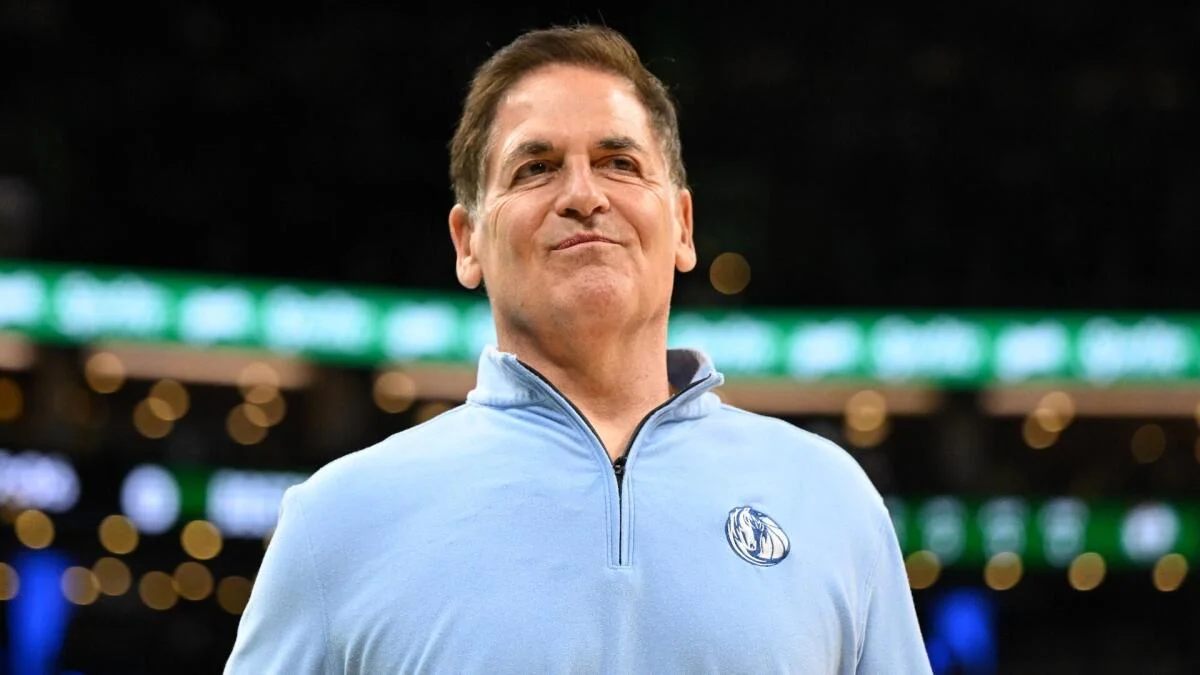

Indiana’s ascendence to the top of the college football world is nothing short of stunning, as Curt Cignetti arrived in Bloomington and immediately turned into a contender. Cignetti’s displays a powerful ability to get buy-in from all levels of the program, from players to the administration to boosters, tapping into Indiana’s alumni base to get the Hoosiers closer to the nation’s top programs in spending.
Among the alumni that Cignetti convinced to invest in the program is billionaire Mark Cuban. The investor and now-minority owner in the Dallas Mavericks has plenty of cash on hand after selling the majority stake in the Mavs, and after never giving to his alma mater’s athletics department previously, Cuban made back-to-back major donations to help the Hoosiers compete in the portal.
Cuban confirmed he sent in another donation prior to the opening of the transfer portal on Jan. 2, telling Front Office Sports he “already committed for this portal.” While he wouldn’t confirm how much he gave, he did hint that it was a bigger gift than last year — “Let’s just say they are happier this year than last year.”
That investment from Cuban and others has already paid major dividends for the Indiana program. After a playoff berth in 2024, the Hoosiers improved even further in 2025, landing the No. 1 overall seed in the College Football Playoff after an undefeated season and winning the Big Ten championship. They’re now the favorites to win it all and will look to punch their ticket to their first national title game in a rematch with No. 5 Oregon on Friday night in the Peach Bowl.
The transfer portal played a huge role in Indiana’s success, as Cignetti brought much of his James Madison team with him in addition to a number of key players via the portal — most notably Heisman Trophy winning quarterback Fernando Mendoza.
While the on-field focus remains the Ducks, the Hoosiers are aggressive once again in the portal for 2026. Indiana’s put together another big portal haul, ranking fourth in 247Sports’ transfer portal class rankings, putting Cuban’s money to good use by landing nine commits. The headliners so far are TCU quarterback Josh Hoover and Michigan State wide receiver Nick Marsh, as they look to reload at key positions on offense to stay on top of the Big Ten.
NIL
Florida Coach Jon Sumrall Can’t Hand Out Shoes, But Can Pay Players ‘Whatever’
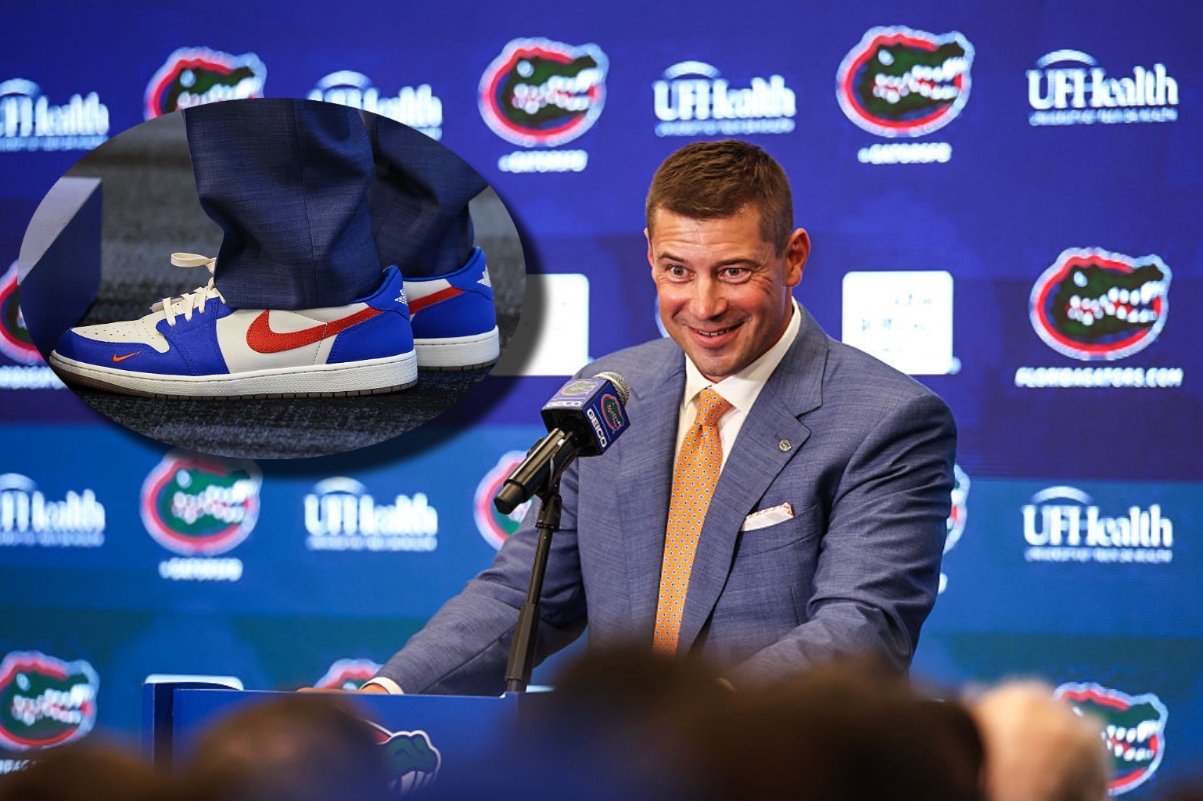
The NIL era continues to be wild.
Since the NIL era began in college athletics back in 2021, the landscape of college sports has often been described as ‘The Wild, Wild West.’ As we enter 2026, that phrase doesn’t do the current situation any form of justice. There were at least some laws in the Wild, Wild West.
While there are rules – it would be more accurate to just call them guidelines – when it comes to what you can and can not do regarding NIL, they very much feel optional at this point in the proceedings.
Newly appointed Florida head coach Jon Sumrall recently joined Jonathan Hutton and Chad Withrow on OutKick’s Hot Mic and gave a very real example of just how little sense said NIL guidelines make.
With Florida being sponsored by the Jordan brand, one would imagine that Sumrall could hand out as many pairs of shoes as humanly possible to players after their careers wrap up in Gainesville. But no, that isn’t the case at all.
“We give out Jordan Brand shoes here, because we’re a Jumpman school,” Sumrall noted. “So, that’s like a cool, hip thing. And I’ve got all those Jordans on my desk here, but we can’t give them to the players after their careers are over because the monetary value is too great. It’s called an extra-benefit.”
“I’m like, the shoes are worth a couple-hundred bucks, I don’t know maybe a couple thousand bucks, I don’t know how much they’re worth. But, we’re already paying these dudes. Why can’t we give them these shoes?”
That’s a valid question, coach.

Jon Sumrall being introduced as Florida’s next head coach. (Photo by James Gilbert/Getty Images)
Many players are being paid six to seven figures per season to play, and are paid that sum regardless of performance, but handing out a pair or two of shoes that your team is already sponsored by is a no-no.
Good luck trying to make that make any sense.
The funniest piece in all of this is that someone at Florida likely had to tell Sumrall shortly after he was hired that he wasn’t allowed to hand out shoes. The look on his face when he was told that had to have been priceless.
NIL
Demond Williams Jr. Entering Portal Could Start NIL Legal Battle With Washington

A fresh NIL deal signed last week is now at the center of a potential legal battle as Washington challenges the quarterback’s attempt to leave football program.
Demond Williams Jr. signed a new NIL contract with Washington just days ago to return for the 2026 season as the Huskies starting quarterback. On Tuesday night, the football program was shocked to see on social media that Williams had announced his intentions to enter the transfer portal.
In a post on Instagram, Williams said that entering the portal was “best for me and my future” where he proclaimed that he was now planning on leaving Seattle.
But there’s one big problem for the quarterback, and it all centers around the revenue-sharing contract he signed with the school.
Trinidad Chambliss’ Ole Miss Future Hinges On NCAA Waiver — New NIL Deal Raises Stakes With Potential Lawsuit
His announcement came as a shock to those within the Washington football building, according to multiple sources. When you consider the fact he just signed a new deal, it’s not hard to imagine the reactions within the program.
Sources also told OutKick that the school has no reason to let Williams out of his agreement, which could end up carrying a heavy financial burden if taken to court. Right now, Washington is exploring its options when it comes to legal remedies around the situation.
The crux could come down to whether Washington will now have the rights to his NIL, meaning he would not technically be able to sign the same type of agreement with a different school. This could also mean the Huskies would own Demond’s rights pertaining to NIL, which could lead to Williams paying the school a substantial amount of money to play somewhere else next season.
After passing for over 3,000 yards and 25 touchdowns last season, the Huskies negotiated a new deal for Williams, which he had signed within the past week.
Now, we could have a major battle playing out while the transfer portal continues to produce interesting storylines, along with seven-figure deals.
In the case of Washington, the school uses a template that is provided by the Big Ten in signing Demond Williams. If you remember, this is the same type of agreement that Wisconsin used two years ago when signing Xavier Lucas.
Wisconsin Accuses Miami Of Tampering With Xavier Lucas, Has Full Support Of Big Ten
The Wisconsin transfer ended up leaving Madison, and then enrolling at Miami as a non-student athlete in hopes of skirting the contract.
The school said that Xavier Lucas entered into a ‘binding two-year NIL agreement’ with Lucas, along with a deal also executed between the DB and the Badgers collective.
Washington Prepared To Legally Fight To Uphold Contract
For Demond, the school could come after him for liquidated damages in this case. According to multiple sources, Washington is prepared to fight this through legal remedies, while also looking into other schools for potential tampering.
One prominent NIL attorney spoke with OutKick on Tuesday night, and had this to say about where we are now in terms of contracts with schools, compared to past years.
“This isn’t like it was when you were dealing with collectives and funneling money. You are now dealing with legitimate contracts and legitimate attorneys or general counsel from major universities. The stakes are larger, which means the liability is greater.
“If you don’t have real attorneys from the players’ side reviewing your contract, you’re opening yourself to potential litigation.”
Jon Sumrall Has A ‘Common Sense’ Way To Fix College Football, Hopes To Replicate Ole Miss’ NIL Strategy
Also, officials at Washington are gathering evidence that another school made contact with Williams after he had signed his new deal with the Huskies.
Even though this does play out behind the scenes every so often, this has been a hot-button topic around athletic departments on Tuesday night. There have been plenty of threats made by athletes, through their representatives, in these cases before pertaining to negotiations.
But, having an athlete sign a deal, and then potentially be shopped around in this era might not end up turning out how Demond Williams might’ve hoped.
NIL
Ole Miss’ Chambliss: ‘A little frustrated’ NCAA yet to rule
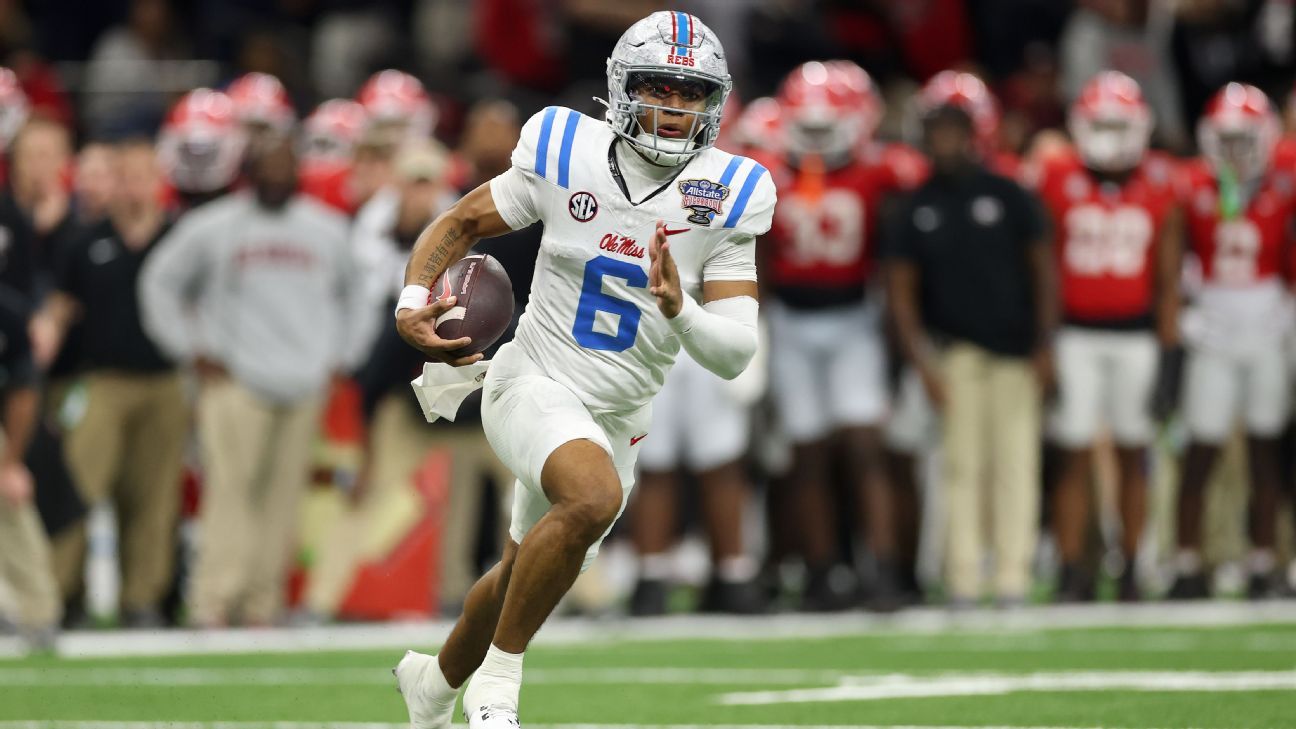
SCOTTSDALE, Ariz. — Quarterback Trinidad Chambliss already agreed to a deal to return to Ole Miss next season. Now, he has to wait to see if he’ll be eligible to play.
Chambliss, one of the breakout college football stars of 2026, filed a medical redshirt waiver for a sixth year of eligibility on Nov. 16. He has yet to receive a definitive answer from the NCAA, although it gave a verbal denial for the waiver in December.
“It has been a little frustrating,” Chambliss told ESPN on Tuesday ahead of the Rebels’ College Football Playoff semifinal Thursday against Miami. “But I can’t let that overtake what my mindset is right now and that’s to win a football game and beat Miami. So I would say I’m a little frustrated, but I can’t let that take over me.”
Chambliss is coming off one of the season’s defining performances in one of its wilder games, as he threw for 362 yards in a 39-34 quarterfinal win over Georgia, which included 20 fourth-quarter points for the Rebels. If he were to return next season, he’d be set to earn millions of dollars, something he didn’t get when he left Division II Ferris State for Ole Miss last year. Entering the season, he was slated to back up Austin Simmons.
Chambliss’ lawyer, Tom Mars, mentioned in a letter to the NCAA on the quarterback’s behalf that his client would “suffer irreparable harm” if he’s not granted the waiver. The crux of Chambliss’ case is that he’s asking for a medical redshirt year from his sophomore season at Ferris State. He supplied 91 pages of medical documents that showed he was battling a respiratory issue and hired Mars to help his case. The NCAA is seeking contemporaneous notes that detail his care.
Mars expressed his frustration with the pace of the case to ESPN on Tuesday night.
“It’s been more than seven weeks since Ole Miss provided the NCAA with all the information they needed to make a decision,” he said. “If the NCAA believes its bylaws clearly required more than what was provided, or that the information wasn’t sufficient to justify a waiver, one has to wonder why they still haven’t made a decision.”
Mars said that he and other lawyers have been working for the past week on immediate contingency plans in the event the waiver is denied.
When asked by ESPN how he’d plead his case to the NCAA, Chambliss responded: “I would just say we have evidence and we have an actual reasoning. There’s some kids that don’t have a reasoning on why they should get another year. And I mean, I have an actual case.
“It’s legit, and I hope that they can find whatever in their hearts or in their minds that they can see that and see that I’m a great guy. I’m all for college football and I feel like this year has proven that I’m good for college football and I think that I should deserve another year.”
Chambliss also reflected on what the money in the contract he agreed to with Ole Miss would mean to him and his family.
“It would mean a lot,” he said. “Not everything is about money, but that sure does help. And for me to be in the position that I’m right now, all the hard work and sacrifice that I put in to get to where I am right now, I feel like I’ve earned that. And I feel like with the waiver being approved, I’ve earned the right to have the success or whatever comes with it. And that if it’s NIL or any other things, then so be it.”
Chambliss’ public commitment to return to Ole Miss for 2026 provided another mile marker of momentum. This all came a few weeks after the school appeared fragile in the wake of Lane Kiffin’s departure to LSU.
But two CFP wins and a flurry of returners such as Chambliss, star tailback Kewan Lacy and a handful of star defensive players have fortified Ole Miss for the future.
“We’re committed to him and I’ll leave that to the legal people, who have kind of looked into the case, and whether or not it has legs,” Ole Miss quarterback coach Joe Judge said. “And obviously they felt very strongly about it. So when they told us like, ‘Hey, this is something that absolutely should be ruled in his favor.’ Then we said, ‘Let’s be committed to our player and back him up.'”
-

 Rec Sports3 weeks ago
Rec Sports3 weeks agoPrinceton Area Community Foundation awards more than $1.3 million to 40 local nonprofits ⋆ Princeton, NJ local news %
-

 Sports2 weeks ago
Sports2 weeks agoBadgers news: Wisconsin lands 2nd commitment from transfer portal
-
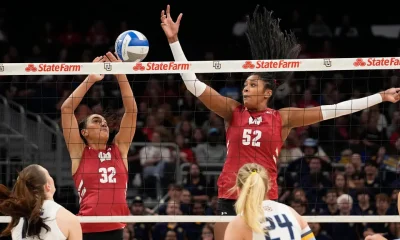
 Sports3 weeks ago
Sports3 weeks agoBadgers news: Final Four Game Thread vs. No. 1 Kentucky Wildcats
-

 Rec Sports5 days ago
Rec Sports5 days agoFive Youth Sports Trends We’re Watching in 2026
-

 Sports2 weeks ago
Sports2 weeks agoIs women’s volleyball the SEC’s next big sport? How Kentucky, Texas A&M broke through
-
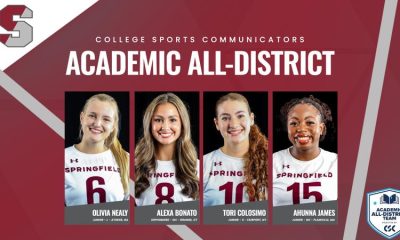
 Sports3 weeks ago
Sports3 weeks agoFour From Women’s Volleyball Named to College Sports Communicators Academic All-District Team
-

 Rec Sports2 weeks ago
Rec Sports2 weeks agoNBA, Global Basketball Community Unite for World Basketball Day Celebration
-
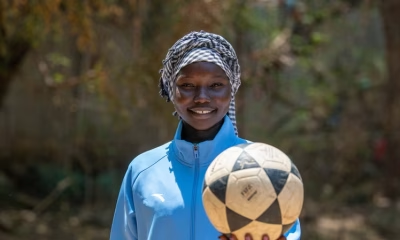
 Rec Sports3 weeks ago
Rec Sports3 weeks agoRefugee-Focused Youth Sport Initiatives : Moving for Change
-

 Rec Sports3 weeks ago
Rec Sports3 weeks agoYouth Sports Business in 2025: The Year the Industry Grew Up
-
Rec Sports3 weeks ago
Inside the NWSL’s first combine: Can the league create a more robust pathway for American talent development?


































